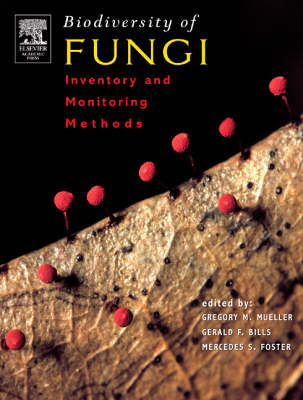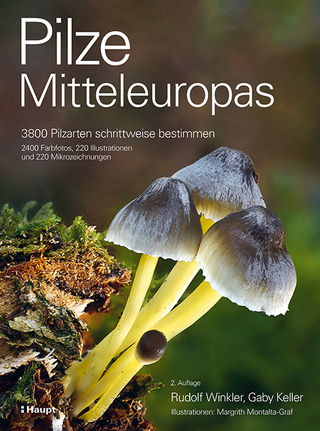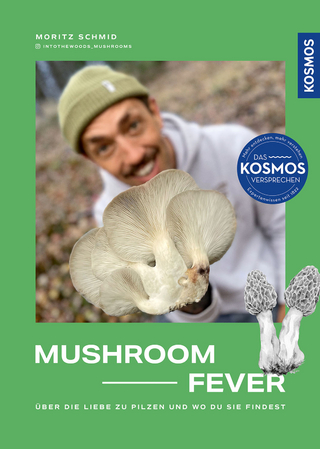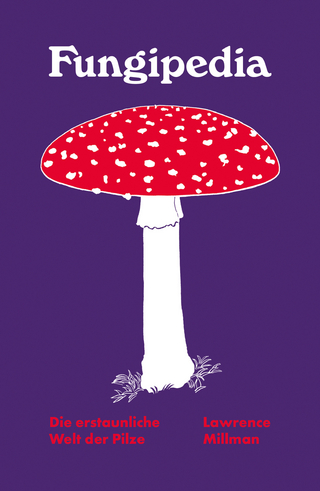
Biodiversity of Fungi
Academic Press Inc (Verlag)
978-0-12-509551-8 (ISBN)
Biodiversity of Fungi is essential for anyone collecting and/or monitoring any fungi. Fascinating and beautiful, fungi are vital components of nearly all ecosystems and impact human health and our economy in a myriad of ways. Standardized methods for documenting diversity and distribution have been lacking. A wealth of information, especially regrading sampling protocols, compiled by an international team of fungal biologists, make Biodiversity of Fungi an incredible and fundamental resource for the study of organismal biodiversity.
Chapters cover everything from what is a fungus, to maintaining and organizing a permanent study collection with associated databases; from protocols for sampling slime molds to insect associated fungi; from fungi growing on and in animals and plants to mushrooms and truffles. The chapters are arranged both ecologically and by sampling method rather than by taxonomic group for ease of use. The information presented here is intended for everyone interested in fungi, anyone who needs tools to study them in nature including naturalists, land managers, ecologists, mycologists, and even citizen scientists and sophiscated amateurs.
Professional Activities: -Review Panel, Graduate Education Program, organization for Tropical Studies (2000-present) -International Ornithological Committee, Member (1998-present) -American Ornithologisits' Union: Vice President (1994-1995); Council (1977-1984; 1986-1989; 1991-1994) and various committees -Advisory Board, Guyana Biodiversity Program (1992-1993) -Association for Tropical Biology, Councilor (1993-1994) -AIBS Council, AOU Representative (1993) -UNEP Global Biodiversity Assessment Workshop on Inventory and Monitoring, invited participant (1994) -All Taxa Biodiversity Inventory Workshop, invited participant (1993) Taskforce of Biodiversity for Agenda 21, U.S. Dept. State, Invited particpant (1993) -Co-Organizer, Symposium on the Interface of Science and Conservation, Cooper/Wilson Meeting, Norman, OK (1991) -Smithsonian Taskforce on Biological Diversity, invited participant (1989-1990) -Review Panel, Division of Zoology, Field Museum of Natural History, Chicago (1990) -Coordinator, First International Workshop on CUratorial Techniques for Natural History Museums (Washington, DC 1987) -Coordinator, Ornithology Group, Biota of Cerro de la Neblina, Venezuela Project (1984-1986) -Cooper Ornithological Society Council (1975-1978) -Point Reyes Bird Observatory, Board of Directors (1979-1980) -U.S. Section Delegate, ICBP (1983-1986) Reviewer of Grant Proposals for National Science Foundation, National Geographic Society, Earthwatch, Smithsonian Institution, International Council for Bird Preservation, Amrerican Ornithologists' Union, National Fish and Wildlife Foundation, World WIldlife Fund, USGS Conservation Activities (current): -Steering Committee, Inst. for Conservation Biology, Smithsonian Institution (1996-2000) -Director, Founding Member, American Bird COnservancy (1994-2001) -Board of Directors, Pan American Continental Section, International Council for Bird Preservation (ICBP, 1985-1995; Chair 1987-1990) -Coordinator, Latin American Library Enhancement Program (1987-1995) -Scientific Advisor, National BioInventory Program, Paraguay (1980-present) -Advisor, National Museum of Natural History, Asuncion, Paraguay (1982-present) -American Ornithologists' Union Committee on Interamerican Affairs (1990-1995) -Scienific Advisor, Asociacion de Conservacion para la Selva Sur, Cusco, Peru (1987-1989) Teaching Experience: -Lecturer, MAB Biodiversity Monitoring Course (1993, 1994) -Visiting Faculty, Department of Zoology, University of Maryland, College Park (1983, 1984) -Lecturer, Department of Zoology, University of California, Berkeley (1978-1980) -Interim Assistant Professor, Department of Biology, University of South Florida, Tampa (1974-1975; 1978) -Lecturer, Department of Biology, California State Polytechnic University, Pomona (1966-1968) -Visiting Faculty, Organization for Tropical Studies, Costa Rica (1967, 1971, 1974, 2001) -Member Doctoral and Master's committees. Postdoc Advisor (1978-present) -Courses taught: Vertebrate Reproduction, Vertebrate Natural History, Ornithology, Ecology, General Biology, Introductory Invertebrate Zoology, Evolution for Non-majors, Ecology for Non-majors, Human Physiology, Graduate Seminars in Evolution, Seminar Preparation Field Research: -Mexico and Central America (38 months, 1966-1992 -Paraguay (19 months, 1976-1983) Peru (49 months, 1977-2000) -other South America (4 months, 1979-1987) -Asia/Africa (6 weeks, 1987-1988) Professional Societies: -AAAS -American Ornthologists' Union -American Society of Naturalists -Association Field Ornithologists -Society Conservation Biology -Ecological Society of America -Neotropical Ornithological Society -SDE, Graduate Women in Science -Sociedad Antquena Ornitologia -Wilson Ornithological Society Academic Employment: 1997-present: Adjunct Professor, Department of Plant Pathology, Rutgers University, New Brunswick, NJ 1987-1988: Assistant Professor (temporary), Department of Botany, University of Wymonig, Laramie, WY. Lecturing in General Biology; Introductory Mycology; Algae & Bryophytes; Plants, Civilization, and Agriculture. July, 1987: Instructor, Filed Mycology, State University of New York at Cortland College, Cortland Outdoor Education Center, Raquette Lake, NY. Spring 1985: Academic advisor, College of Arts & Sciences, Virginia Polytechnic Institute & State University. 1980-1985: Graduate teaching assistant, Department of Biology, Virginia POlytechnic Institute, for General Biology; General Microbiology; Introductory Mycology; Advance Mycology; and Phycology. Professional Activities: 1999: Advisory Board, International Union of Microbiological Societies, IXth International Congress of Mycology, Sydney, Australia. 1992-present: Mycology Department Advisory Committee for the American Type Culture Collection 1989-1992, Chairman 1992 in Portland, Oregon: Program committee for Mycological Society of America's Annual Meetings -Thesis advisory committees: Russell Duncan, M.S. thesis, Rutgers University Ana Esperanza Franco, Ph.D. dissertation, The New York Botanical Garden -Ad hoc referee for Mycologia, Canadian Journal of Botany, Mycotaxon, Sydowia, Mycological Research, Mycopathologia, Phytopathology, Journal of Industrial Microbiology, Applied and Environmental Microbiology, Bioscience, Chapman & Hall Press, Acta Botanica Mexicana, Journal of Biomolecular Screening -Reviewer for USDA, Agricultural Research Service research projects, NSF international, ecology and systematics sections, Internaional Science Foundation, and British Research Council -Mushroom toxicology workshop, Blue Ridge Poison Control Center, University of Virginia Medical School, Charlottesville, VA, October 1985. -Conducted collecting and identification field trips and presented lectures on higher fungi, 1981-1988, for: Southeastern Universalist Unitarian Summer Institute, Radford, VA; USDA Forest Service Cranberry Mt. Visitor Center, Cranberry Glades, WV; Claytor Lake State Park, Dublin, VA; Roanoke Vally Science Museum, Roanoke, VA; Mycological Association of Washington, Chevy Chase, MD; Colorado Mycological Society, Denver, CO; Buffalo Museum of Science, Buffalo, NY. Professional Societies: -Mycological Society of America -British Mycological Society -Society of Industrial Microbiology and Biotechnology -Ananet-The Anamorph Information Network National Science Foundation Advisory Panel Participation: 1992: Biotic Survey and Inventory Advisory Panel 1993: Systematic Biolgoy Advisory Panels (2 panels: April & October) 1995: Systematic Biology, Special Advisory Panel for Partnership for Enhanced Expertise in Taxonomy (PEET) Program Teaching Experience: 1977-1982: Graduate Teaching Assistantships--Southern Illinois University, Carbondale; The University of Tennessee, Knoxville 1995: Biodiversity Through Time. BioSci. 157. University of Chicago 1996: Ecology of Mycorrhizae. BioSci 594. University of Illinois at Chicago 1997: Mutualisms and Symbiosis. BioSci 260 (undergraduate majors course). University of Chicago 1998: Ecology and Evolution. BioSci 128 and 131. University of Chicago Fungal Mutualisms. BioSci 594 (graduate seminar course). University of Illinois at Chicago 1999 & 2001: Mutualisms and Symbiosis. BioSci 261 (undergraduate major course). University of Chicago Public Service: 1985-present: Contact for mushroom cases, Illinois Poison Center and Chicago area hospitals 1985-present: Scientific Advisor, Illinois Mycological Association
PART I: General Issues 1. Fungi and Their Allies 2. Preparation, Preservation, and Use of Fungal Specimens in Herbaria 3. Preservation and Distribution of Fungal Cultures 4. Electronic Information Resources 5. Fungal Biodiversity Patterns 6. Molecular Methods for Discriminating Taxa, Monitoring Species, and Assessing Fungal Diversity
PART IIA: Recommended Protocols for Sampling Particular Groups of Fungi: Direct Collecting and Isolation Protocols for Macrofungi and Mircofungi on Soil, Wood, Leaves, Lichens, and Other Substrata 7. Fungi on Living Plant Substrata, Including Fruits 8. Terrestrial and Lignicolous Macrofungi 9. Lichenized Fungi 10. Sequestrate Fungi
PART IIB: Recommended Protocols for Sampling Particular Groups of Fungi: Isolation Protocols for Readily Culturable Microfungi Associated with Plants 11. Microfungi on Wood and Plant Debris 12. Endophytic Fungi 13. Saprobic Soil Fungi 14. Fungi in Stressful Environments 15. Mutualistic Arbuscular Endomycorrhizal Fungi 16. Yeasts 17. Fungicolous Fungi
PART IIC: Recommended Protocols for Sampling Particular Groups of Fungi: Collecting and Isolation Protocols for Fungi Associated with Animals 18. Insect- and Other Arthropod-Associated Fungi 19. Fungal Parasites and Predators of Rotifers, Nematodes, and Other Invertebrates 20. Fungi Associated With Vertebrates 21. Coprophilous Fungi 22. Anaerobic Zoosporic Fungi Associated with Animals
PART IID: Recommended Protocols for Sampling Particular Groups of Fungi: Collecting and Isolation Protocols for Aquatic Fungi and for Protoctistans Formerly Treated as Fungi 23. Fungi in Freshwater Habitats 24. Marine and Estuarine Mycelial Eumycota and Oomycota 25. Mycetozoans 26. Fungi Associated with Aquatic Animals
PART III: Appendices, Glossary, Literature Cited, and Miscellaneous
| Erscheint lt. Verlag | 3.7.2004 |
|---|---|
| Mitarbeit |
Chef-Herausgeber: Mercedes S. Foster |
| Verlagsort | San Diego |
| Sprache | englisch |
| Maße | 216 x 276 mm |
| Gewicht | 2620 g |
| Themenwelt | Naturwissenschaften ► Biologie ► Mykologie |
| Naturwissenschaften ► Biologie ► Ökologie / Naturschutz | |
| ISBN-10 | 0-12-509551-1 / 0125095511 |
| ISBN-13 | 978-0-12-509551-8 / 9780125095518 |
| Zustand | Neuware |
| Haben Sie eine Frage zum Produkt? |
aus dem Bereich


